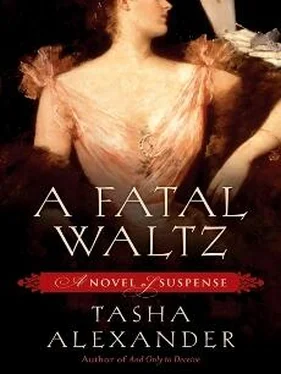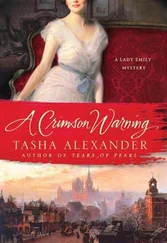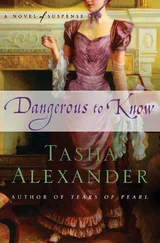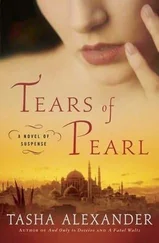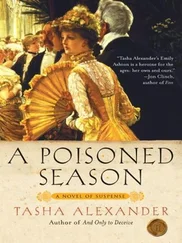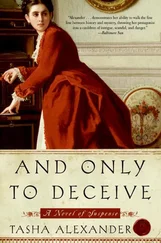If he were still alive.
A sentence that I couldn’t bear to say aloud. Not to Margaret, or Ivy, or Cécile, or even to myself. I tried to focus on Robert in Newgate, hoping that would push thoughts of Colin from my mind. This was futile, of course, but also unnecessary. I should have realized that my mother’s presence would serve as its own monumental distraction.
“I’m not sure what to think of this don of Miss Seward’s,” she said, accosting me in my bedroom as I was dressing for dinner. “He’s well-mannered and decent enough looking. A bit old for her, perhaps, but she’s the sort of girl who could stand a firm guiding force in her life.”
I raised my eyebrows and looked in the mirror, watching Meg expertly win another struggle to force my hair into submission. “They are very well suited to one another, but I’m not sure that Margaret has any intention of getting married.”
“You talk such nonsense, Emily. The girl needs to be married. Mr. Michaels has a decent income. Not spectacular—I certainly wouldn’t want you to settle for such a thing—but she is American, after all, and she does have a fortune of her own. It’s a pity she and the Duke of Bainbridge were never able to work out their differences, but really, she may be better off where she is.”
“Can it be, Mother, that you’re contemplating the arrangement of a love match?”
“Love’s all well and good, so long as it doesn’t distract from what’s really important. You never did tell me why you object to Henry Elliott for her.”
“Well…” I watched her in the mirror. “It’s not so much that I’ve an objection to Henry. But I’ve heard that there is a certain young woman with an impeccable background and egregious fortune who’s set her cap for him.”
“Really? Who?”
“I’m not at liberty to reveal a confidence.” Particularly when it was entirely fictional.
“Does Henry know this?”
“If he doesn’t, he will soon.”
“How interesting. I shall tell Lady Elliott to keep her ear to the ground. Perhaps I should speak with Mr. Michaels this evening.”
Already I felt sorry for Mr. Michaels. He did not stand a chance.
I missed Ivy that night. Cowed by my mother, she was keeping to her bed, but I was beginning to think she was enjoying herself. I’d slipped her my copy of Lost and Saved , Caroline Norton’s sensational novel of Beatrice Brooke, who is tricked into believing that her lover has married her after she falls ill while they’re on an illicit trip to Egypt. Melodrama at its best.
I paid only the slightest attention to my friends that evening. After dinner, when we’d retired to the library, I sat at my desk and started to write a letter to Colin, balling up the paper before I’d finished three sentences and beginning again.
“That’s your fifth fresh start,” Margaret said half an hour later, carrying the decanter with her and refilling my port. “What are you writing?”
“Apparently nothing,” I said.
“I wish someone would spend half that time crafting a letter for me,” Jeremy said.
“You’d have to be less of a cad to earn such treatment,” I said.
“You needn’t be so cruel.” He sipped his port.
“Emily’s horribly cruel,” Margaret said and then lowered her voice. “But I’m having more fun than I would’ve thought possible playing with her mother. She’s unexpectedly amusing.”
“You say that now,” I said. “I wonder if you’ll still believe it next week when she’s started planning your wedding.”
“It will never happen. Besides, I’d have to get married in New York. I’m safe.”
“No one is safe from Lady Bromley,” Jeremy said. “I’ve known that since before I could walk.”
Margaret circled the room, filling everyone’s glasses and only briefly joining Cécile and Mr. Michaels in an animated conversation before stopping in front of my mother. “Now, Lady Bromley, you must humor me and try some port.”
“I categorically refuse,” my mother said. “It’s unseemly.”
“Do you really think so?” Margaret asked, her face a mask of mock sincerity.
“There’s no question.” She dropped her voice to her favorite and overly loud stage whisper. “What would Mr. Michaels say?”
“Oh, I wouldn’t worry about that. He thinks it’s an excellent vintage.” She pressed a glass into my mother’s hand. For a moment it appeared as if she would drink it, and I prepared myself to be overwhelmed with awe for Margaret. But alas, it was too much to hope. My mother deposited the glass on a table and asked for sherry. I was about to ring for Davis when he entered the room.
“This was just delivered,” he said, handing me a wire. I tore it open at once, hoping it was from Colin. It was not.
Meeting soon with someone who may be persuaded to help me stop H. No sign of C. which means he’s hard at work. No cause to worry.
— Kristiana von Lange
The countess’s suggestion that I ought not worry had precisely the opposite effect on me. I had an appointment with Sir Julian the following morning, the first day he was back from a brief jaunt into the country. I felt so lethargic that I sent for my carriage instead of walking to his office and spent the entire drive pulling at my gloves, wondering what was happening in Vienna.
“I do hope you’ll make a regular habit of calling, Lady Ashton,” Sir Julian said as soon as I’d arrived at his office. “Your charm is devastating, and it gives the boys a lift to see you.”
“I’m not sure that’s an appropriate compliment, but I shall accept it with grace nonetheless.”
“You are too kind, Lady Ashton, too kind.” He slammed his hand down on his desk. “Now! What can I do for you? Do you need more information about the debauched failings of your peers?”
“No. Do you remember, at Beaumont Towers one evening before dinner you were talking to Lady Fortescue, and she excused herself rather suddenly?”
“Yes, I think I do. It was a bit strange, but she’s an odd sort of woman. An exceedingly poor conversationalist.”
“What were you talking about when she ran out?” I asked. “I heard you say something about scandals delighting us.”
“Yes, let’s see…I was telling her about her husband’s penchant for controlling the newspapers.”
“Did you tell her about Albert Sanburne?”
“Of course not. Though I suppose I did make an oblique sort of reference to his case and said that her husband had paid to keep the story out of the paper.”
“She might have known to whom you were referring.”
“Impossible. Only someone with a very close connection would have caught the reference.”
“You don’t know who she is, then?” I asked. “Albert Sanburne was her brother.”
“Yes, yes, but I can’t imagine anyone would have told her the details of the affair. She was just a girl. She couldn’t possibly have known.”
I knew at once that Sir Julian couldn’t have been more wrong.
I raced back to Berkeley Square to collect my friends, but Margaret and Cécile were out, and my mother was reading to Ivy from the Bible; there was no chance I could steal her away and take her to Yorkshire with me. I just made the train I needed, and as I sat in my compartment, I felt nothing but anxious dread. Ordinarily, a book would have served as a welcome distraction, but instead of a novel, I’d brought with me the Greek grammar that Colin had given me more than a year ago; the volume he’d used in school. I paged through it idly, not really reading, certainly not studying, simply taking slim comfort in the fact that he had held the book himself.
I’d wired Lady Fortescue to alert her of my arrival, and she had a carriage waiting for me at the station. The drive along the moors was shorter than I remembered it. All too soon I was looking up at the edifice of Beaumont Towers. I’d never liked the house—it was an architectural nightmare—but now it had been imbued with a feeling of piercing sadness that prevented me from casting upon it a critical eye.
Читать дальше
